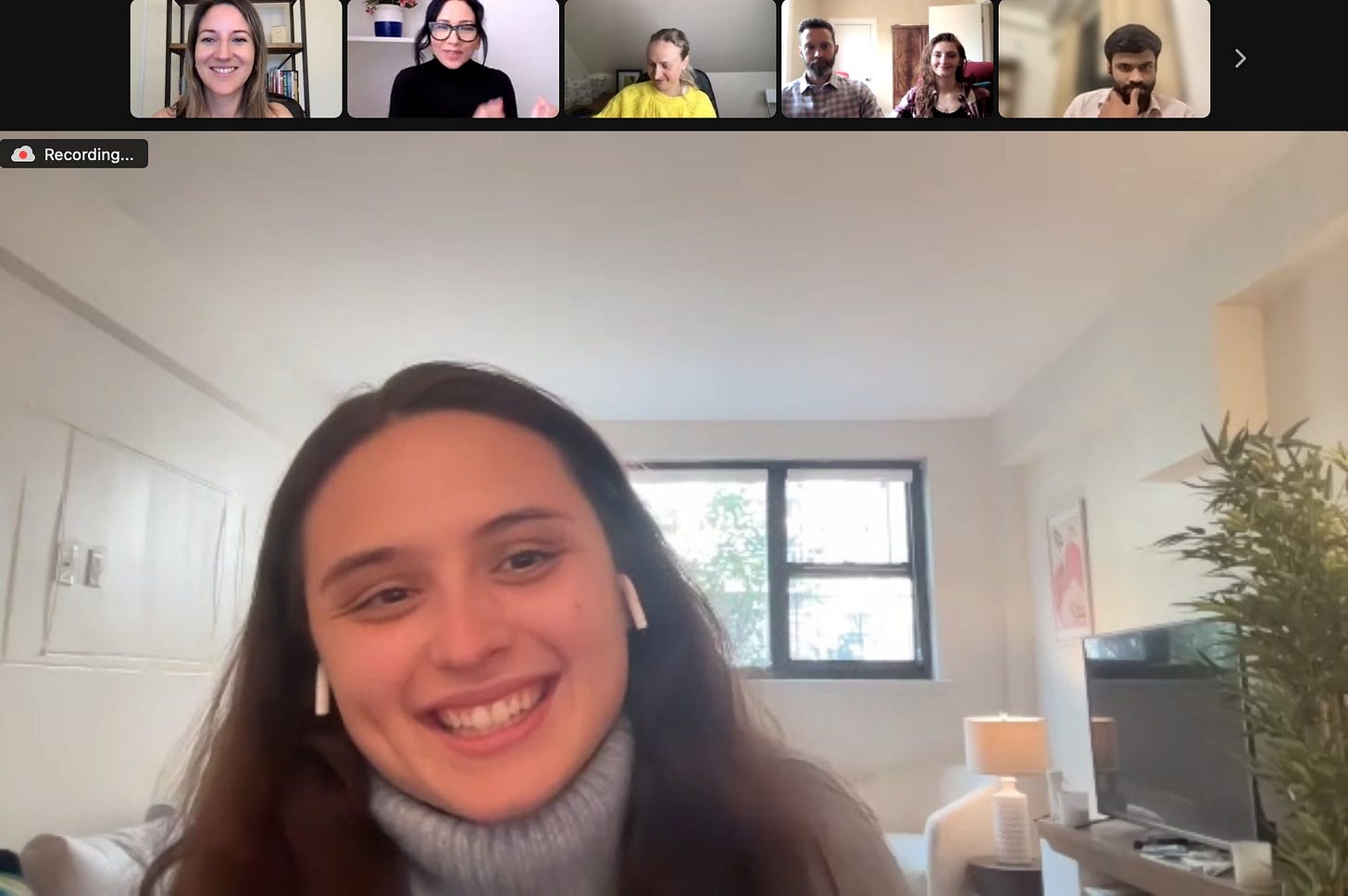One Learning Strategy That Makes Conquering Fear & Ambiguity Easier
Teaching & entrepreneurship are less overwhelming when you think of yourself as a curator.
Montreal looked like a snow globe yesterday—though less picturesque and more like someone had frantically shaken us.
What’s normally a nice stroll to the dentist became a twenty-five-minute obstacle course as I trudged through messy sidewalks and narrowly avoided colliding with others. Everyone walked with their heads tilted downward or cocked to one side to avoid getting hit in the face with snow—save for the odd few sporting sunglasses as if they were down south.
My best sighting was a man (wearing sunglasses) FaceTiming someone as he walked. He was laughing his head off as he gestured to the blizzard around him. I could tell immediately by his enthusiasm—and moments later from his conversation—that he wasn’t from here.
His appreciation for what native Montrealers would deem crappy weather made me smile. It also made me think…
How often do we make our lives harder by failing to appreciate our circumstances?
Take entrepreneurship for example. One of my biggest takeaways since quitting my job fifteen months ago is how much my past experiences prepared me for this journey, despite my internal monologue saying “I’ve never done this before.”
The reality is no matter how new something feels, you’re never really starting from scratch. There’s always prior knowledge and experience you can draw on. In learning design, we call this “activating prior knowledge.”
This concept can work to your advantage in two ways:
As an Entrepreneur
Entrepreneurship is an ongoing learning journey. That means a huge part of the job is conquering fear and navigating ambiguity as you do things for the first time. But the beauty of this is you become more creative. Forced to draw on prior knowledge and experience, you become a curator in new areas.
📌 Takeaway: Give yourself a pep talk when you feel scared or ill-prepared for a “new” challenge. Do these three things:
Acknowledge the fear or intimidation you feel and the underlying reasons for it.
Identify prior knowledge or experience you can draw on to overcome them.
Remind yourself you have conquered parts of this challenge in the past.
The more you exercise this muscle of breaking down new challenges into familiar parts, the more confident you’ll become in tackling the unfamiliar parts. It’s just a matter of isolating them.
As a Course Creator or Teacher
When I work with creators building courses on novel topics (ex. Web3, Crypto, and AI), they often worry about how to explain such “unfamiliar” topics. But as I assure them, the reality is no topic—no matter how novel it seems—is completely foreign to your students. There’s always prior knowledge you can activate to help them understand a new concept.
For example, last May, I helped Misha da Vinci pilot her Web3 course and expert guest Chase Chapman joined us for a session on Decentralized Autonomous Organizations (commonly referred to as DAOs).
Most people didn’t get how DAOs worked. But Chase explained they resemble Co-ops, Impact Networks, and Sociocratic Organizations in terms of structure. And by drawing connections with each, students were able to understand DAOs.
📌 Takeaway: Introduce new concepts to students by activating their prior knowledge. Ask yourself these questions:
What similar concepts are students familiar with?
How do they relate—yet differ—from the new concept?
The better you compare and contrast similar concepts, the easier students will be able to understand the new concept. Doing this also instills confidence that students know more than they realize.
Now, back to yesterday in Montreal…
By the time I’d finished my dentist appointment, the sidewalks has been freshly plowed and I made an effort to bask in the blizzard-esque beauty. Look how charming the homes pictured below are with their beautiful bay windows and old-fashioned front porches.
Fun fact: this summer, I learned our neighbourhood has an annual Porchfest event. Here’s the gist from the event organizers:
“Porchfest is a music festival for NDG residents (and friends) to discover local musicians as they perform on neighbourhood front porches. […]
The first community Porchfest was held in Ithaca, New York, and has since inspired many other towns and communities, who now hold very successful Porchfests every year!”
Porchfest reminds me of Fête de la Musique in France (albeit much smaller). If you’re an Emily in Paris fan or familiar with French culture, you’ll know what I mean.
📌 Takeaway: this is me activating your prior knowledge. By relating Porchfest to an event you’re familiar with, you’re better able to contextualize it.
If you’re not familiar with Fête de la Musique, the name of the event sums it up. It’s a celebratory day of music where people play music outside (including parks and public places) and musicians play free concerts for fun. In other words, it’s a nationwide music festival (whereas Porchfest is confined to a neighbourhood).
Either way, cool, right?
Thanks for reading and have a wonder-full week,
⏩ If you want to help me promote my newsletter, share this one with friends.
💻 If you want to build a scalable cohort-based course, join my course community.
☕ If you want to grab coffee in Montreal, hit reply to let me know when you’re in town.




Hey Alexandra! These concepts are really resonating with me this week. I'm keeping this in mind as I prepare an in-depth "how-to" segment in my newsletter:
"The reality is no matter how new something feels, you’re never really starting from scratch. There’s always prior knowledge and experience you can draw on.”
By being mindful of my overly technical writing and comparing similar concepts, I'm hoping this will make my newsletter clear for my readers! Thanks for sharing =)